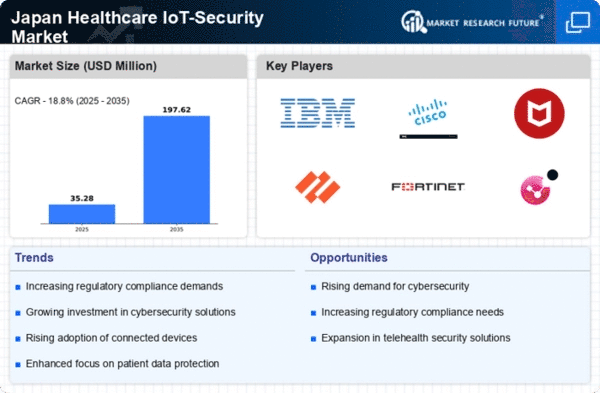Regulatory Pressures
Regulatory pressures are increasingly influencing the healthcare iot-security market in Japan. The government has implemented stringent regulations aimed at protecting patient data and ensuring the security of healthcare systems. Compliance with these regulations is not merely a legal obligation but also a critical factor in maintaining patient trust. Organizations that fail to comply may face substantial fines and reputational damage. As a result, healthcare providers are compelled to invest in security solutions that align with regulatory requirements. The market is likely to see growth as companies seek to enhance their security posture to meet these demands. This regulatory landscape serves as a significant driver for the healthcare iot-security market, as adherence to compliance standards becomes essential for operational continuity.
Increasing Cyber Threats
The healthcare iot-security market in Japan is experiencing heightened concern due to the increasing frequency and sophistication of cyber threats. As healthcare organizations adopt more connected devices, the potential attack surface expands, making them attractive targets for cybercriminals. Reports indicate that healthcare data breaches have surged, with a notable rise in ransomware attacks. This alarming trend compels healthcare providers to prioritize security measures, thereby driving demand for advanced security solutions. The market is projected to grow as organizations seek to protect sensitive patient data and maintain operational integrity. Consequently, the increasing cyber threats are a significant driver for the healthcare iot-security market, as stakeholders recognize the necessity of robust security frameworks to mitigate risks.
Technological Advancements in IoT
The rapid evolution of Internet of Things (IoT) technologies is a pivotal driver for the healthcare iot-security market in Japan. Innovations such as artificial intelligence, machine learning, and blockchain are being integrated into healthcare devices, enhancing their functionality and connectivity. However, these advancements also introduce new vulnerabilities, necessitating comprehensive security measures. The market is expected to expand as healthcare providers invest in security solutions that can safeguard these advanced technologies. For instance, the integration of AI in security systems can facilitate real-time threat detection and response, which is crucial in a sector where data integrity is paramount. Thus, the technological advancements in IoT are shaping the landscape of the healthcare iot-security market, prompting a shift towards more sophisticated security protocols.
Rising Patient Data Privacy Concerns
The rising concerns regarding patient data privacy are significantly impacting the healthcare iot-security market in Japan. As healthcare providers increasingly utilize connected devices, the volume of sensitive patient information being transmitted and stored has escalated. Patients are becoming more aware of their data rights and are demanding greater transparency and security from healthcare organizations. This shift in consumer expectations is prompting healthcare providers to adopt more stringent security measures to protect patient data. The market is likely to expand as organizations invest in solutions that enhance data privacy and security. Consequently, the rising patient data privacy concerns are a vital driver for the healthcare iot-security market, as stakeholders strive to build trust and ensure compliance with privacy regulations.
Growing Investment in Healthcare Infrastructure
Japan's ongoing investment in healthcare infrastructure is a crucial driver for the healthcare iot-security market. The government is actively promoting the modernization of healthcare facilities, which includes the integration of IoT devices for improved patient care and operational efficiency. As these investments increase, so does the need for robust security measures to protect the interconnected systems. The healthcare iot-security market is expected to benefit from this trend, as organizations recognize the importance of securing their infrastructure against potential cyber threats. Furthermore, the allocation of funds towards digital health initiatives indicates a commitment to enhancing security frameworks, thereby fostering growth in the market. This growing investment in healthcare infrastructure is likely to propel the demand for advanced security solutions.

















